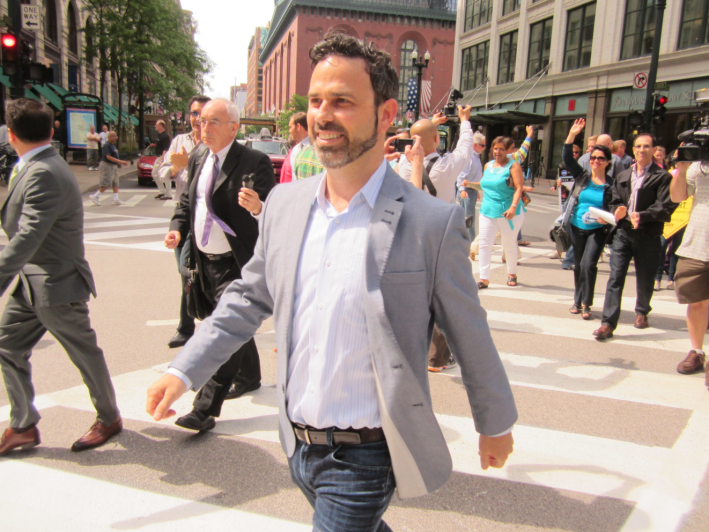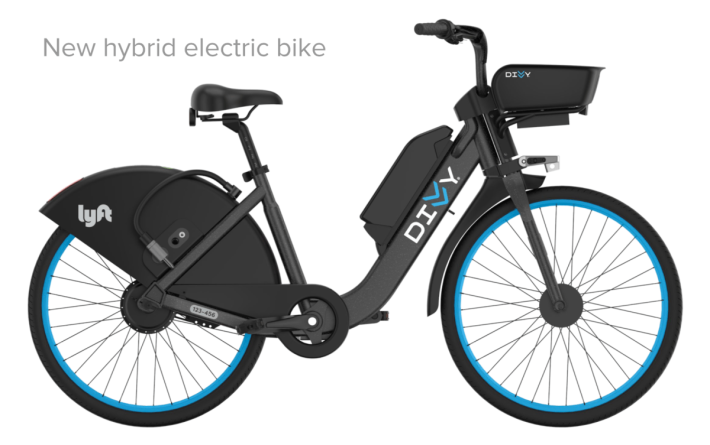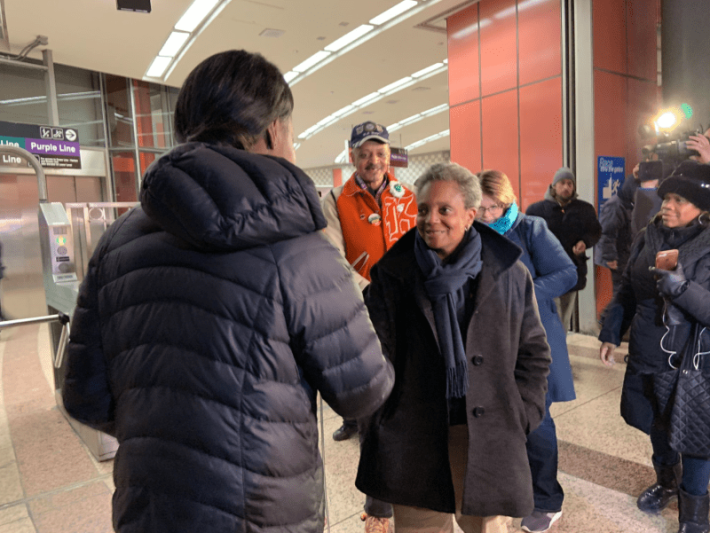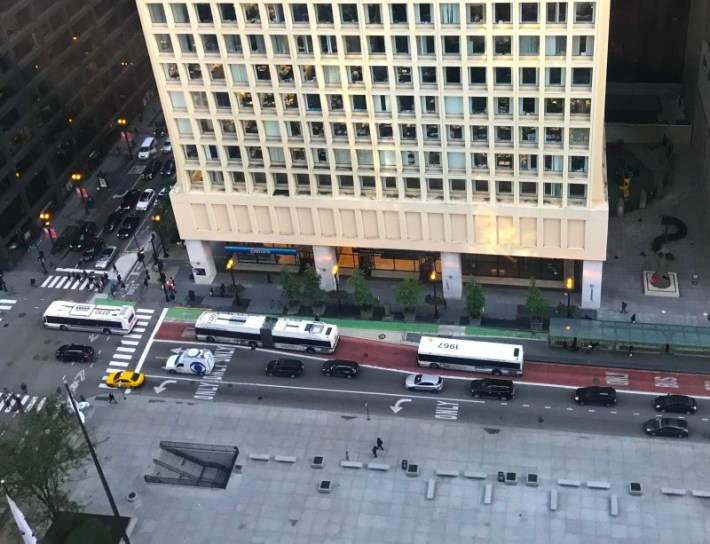Earlier this month, Chicago Department of Transportation commissioner Rebekah Scheinfeld announced that when Mayor Rahm Emanuel left office, she would also be stepping down. Scheinfeld started the job in early 2014 after her more famous predecessor Gabe Klein left the job amid stiff pushback from aldermen for pioneering controversial traffic safety initiatives in Chicago like speed cameras and protected bike lanes.
Scheinfeld began working for the Emanuel administration in 2011 as chief planning officer at the CTA, leading efforts to plan the renovation and extension of the Red Line and to identify potential bus rapid transit corridors, including the now-shelved Ashland Avenue BRT plan. Prior to that she worked at the law firm Mayer, Brown representing clients on infrastructure and transportation projects, and before that she worked as a mixed-income housing developer and for the New York City parks department.
During her time at CDOT, Scheinfeld completed or expanded on many initiatives that Klein got rolling, such as the Chicago Riverwalk; major CTA station renovation and construction projects; the Loop Link express bus corridor; the Bloomingdale Trail; and 100 miles of bike lanes. But she also launched a few major initiatives herself, such as the Vision Zero crash reduction program and constructing three new bike/pedestrian bridges over Lake Shore Drive on the South Side. I conducted an exit interview with her shortly before she left office. Here are some of the topics we discussed.

How Scheinfeld's term at CDOT was different than Klein's
Klein was nationally known as a forward-thinking, audacious transportation official on par with NYC's Janette Sadik-Khan. In contrast, Scheinfeld kept a much lower profile, and her tenure was characterized by a "steady as she goes" ethos. But she rejects the notion that she was simply the person who saw many of Klein's big initiatives to fruition.
Scheinfeld noted that she and Klein started working under Emanuel at the same time and collaborated on several transit projects. "We're different people and neither of us did anything alone," she said. "Many of the things Gabe championed I continued to champion, and they didn't start the day Gabe walked in the door. It takes the leadership and commitment of the mayor to really bring things to a head, and [Emanuel] made transportation central to his vision for the city."
"Gabe and I do have different styles," Scheinfeld acknowledged. "But frankly we were in this role at different points in time of the cycle of the administration. In the first couple of years a lot of projects were in the planning stage, and then when I came in in 2014 we were in the thick of implementing many of them, so a very different type of focus was needed. I like to think that I provided strong leadership in terms of not only giving support to the bigger policy ideas and new initiatives, but also supporting the day-to-day guts of the operation [such as repaving roads and fixing streetlights.]"
Her biggest challenge as commissioner
"We really suffered from declining [financial] resources for transportation," Scheinfeld said. "Mayor Emanuel was incredibly successful in securing federal dollars for transportation under Obama, but unfortunately [the Trump administration] hasn't gotten its act together in terms of a new infrastructure bill."
On the bright side, the commissioner said, "Whoever is the next transportation chief is going to have the benefit of a new state capital bill. I am hopeful that the bill will provide more resources for both day-to-day investments in our neighborhoods as well as the larger transportation projects that are key."

The failed O'Hare Express project
Most transportation experts agreed that Elon Musk's proposal to dig a tunnel to O'Hare and propel travelers to and from the airport in high-speed "electric sled" vehicles was wildly unrealistic, and transportation advocates argued it was an unfortunate distraction from more pressing neighborhood transit needs. But the express was one of Emanuel's pet projects, and Scheinfeld was perhaps its most vocal cheerleader.
The commissioner said she doesn't regret her role in promoting the project, which appears to be going nowhere. Mayor-elect Lori Lightfoot called called Emanuel and Musk's promise that no public money would be used for the express "a fiction."
"Unfortunately we didn't get to a place where there was a final deal," Scheinfeld said. "But there was a lot of misunderstanding about the project and what its value could be for the city. By 2045 an 80-percent increase in daily trips between downtown and O'Hare is projected... When you have a company that would fund an entire system that would be a greener, no-emissions mode, we owed it to people to take that really seriously."
Scheinfeld argued that the O'Hare Express project, which Emanuel's predecessor Richard M. Daley sank $250 million into with little to show for it, could rear its head once more in the future. "Obviously [Musk's] solution and the politics of it were not ripe. But this issue isn't going to go away, and if the the Boring Company continues to refine its approach, maybe that conversation will continue in Chicago."

Her proudest accomplishments at CDOT
Scheinfeld cited her work to get the Divvy bike-share system's contract with concessionaire Lyft amended to include 10,500 new cycles, the electrification of the fleet, and numerous fiscal benefits for the city, in the face of an aggressive misinformation campaign against the deal from Uber. "Divvy is a fantastic system, but financially it was on shaky ground. This stabilizes it, modernizes it, and ensures expansion to the entire city."
She's also proud of launching Vision Zero. "It rebooted the city's traffic safety commitment. In the early days of the administration we had CDOT's Zero in Ten goal and the pedestrian plan, but we realized that we weren't gaining traction because it was only CDOT working on this." The Vision Zero program includes a dozen city departments and city agencies, such as the police department and the CTA. "It's a collaborative and lateral-facing approach."
The commissioner also cited the Smart Lighting project to upgrade 270,000 streetlights to energy-efficient LED lights. "It's an environmental and public safety initiative that touches everyone in the city."

Her decision to leave the job
"I have great respect for Lori Lightfoot," Scheinfeld said, noting that they both worked at Mayer Brown during the same era, in different departments, and they're neighbors in Logan Square. "It would be an honor to work for her, and [Lightfoot's team] did ask me to stay."
However, Scheinfeld indicated that concerns about burnout and a sincere desire to spend more time with her family -- she became a mother while working at CDOT -- were factors in her ultimately turning down Lightfoot's offer. "Eight years of hard-charging through the Emanuel administration was a fantastic experience, but this is a good time to take a bit of a sabbatical and regroup." The commissioner said she has been working with Lightfoot's people on transition issues, and they've been open to her suggestions.
What kind of person should Lightfoot appoint to the job?
There's been plenty of speculation in transportation advocacy circles about who the next CDOT chief will be. I wouldn't be shocked if Scott Kubly, Klein's main lieutenant at CDOT who went on do a good job as Seattle transportation chief, threw his hat in the ring. (But, no, Streetsblog Chicago cofounder Steven Vance isn't interested, although he did serve on Lightfoot's transition committee.)
Scheinfeld said it will be important for her successor at CDOT to have people skills, both for maintaining high staff morale within the department, and collaborating with other city agencies, advocacy organizations, community groups, and, as Klein learned the hard way, aldermen. She added that being able to understand the technical aspects of infrastructure projects is key. "I'm not an engineer, but at this point I speak engineer."
"Chicago needs someone who will really be an advocate for continued investments in sustainable transportation and progressive policies," Scheinfeld said. "And they need to be someone who really understands how transportation is the backbone of economic development and urban development. In my career I've worked in housing, open space, and land use issues. All of these things are interconnected, so you can't be in a silo."

What others had to say about Scheinfeld's tenure, and what's needed from the next chief
Active Transportation Alliance Spokesman Kyle Whitehead credited the commissioner with overseeing the expansion of the city's bikeway network and Divvy, and strengthening the city's commitment to Vision Zero, especially particularly in high-crash areas on the South and West Sides. "This progress was made despite chronic underfunding at CDOT."
Audrey Wennink, director of transportation with the Metropolitan Planning Council applauded Scheinfeld's work on the riverwalk, the Lake Shore Drive bridges, and new CTA stations. "She provided a steady hand at the helm of the agency for her five-year tenure and is well respected for her ability to successfully work with a wide range of stakeholders."
Whitehead said the next commissioner should continue to prioritize safety for all over travel times for cars and trucks by adding another 100 miles of low-stress bikeways and building pedestrian safety infrastructure in high-crash corridors. Lightfoot has committed to budgeting $20 million a year for bike and ped infrastructure. He added that while Loop Link and planned bus improvements on 79th Street are a good start, the next transportation chief needs to pick up the pace by working with the CTA "to expand the city’s paltry four-mile network of dedicated bus lanes by adding another 50 miles.”
Wennink wants to see Lightfoot's transportation commissioner work with the city's planning department to promote affordable transit-oriented development. She also emphasized the need for more bus lanes and traffic safety infrastructure. "It will be critical for the next commissioner to continue to build on Scheinfeld’s Vision Zero efforts to reduce roadway deaths and injuries.
What's your opinion of CDOT's Scheinfeld era? Let us know in the comments.





